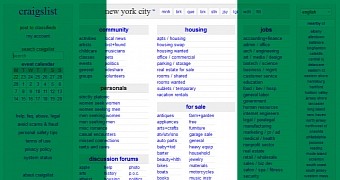A new study reveals that, despite its best efforts, Craigslist, the online listings service, is plagued by an epidemic of rental scams, and the company only manages to flag half of these fraudulent ads.
The study, carried out by three researchers from the University of Maryland, New York University, and Cornell University, studied house rental ads posted in 20 US cities for a period of 141 days in 2014.
Researchers say they detected over 29,000 false ads trying to fool users with different techniques like classic bait-and-switch, but also newer tricks that involved users paying for a credit report, for which scammers received a commission. Overall, the researchers explain Craigslist flagged and removed only 53% of the ads they discovered to be scams.
Most of these proved to be cloned ads, copied from legitimate real estate websites, but listed on Craigslist with a much smaller price. Of these, 2,675 listings had a price that was with over $300 (€270) lower than that of the real ad, listed on other sites.
Additionally, using the listing's IP address, researchers tracked 66.29% of these cloned ads scams back to Nigeria. Their research comes close to the findings of a similar study, which also discovered that 50.3% of confirmed Craigslist scams originated from Nigerian IP addresses.
Researchers created a bot that talked with the scammers
To confirm and detect scams, the researchers even created an automated conversation engine that would engage in private messages with the ad's owner. This bot sent out 2,517 emails to suspicious ads. 237 ad owners responded, and based on their answers, the bot identified 85 scammers.
A new kink observed in Craigslist scams is the usage of pre-foreclosure properties and rent-to-own houses. While not illegal to advertise for these types of properties, researchers discovered that scammers, sometimes well-established companies, often listed properties that weren't available on the market, or had incredibly and suspiciously low prices, in an attempt to reel in victims.
Once somebody called, he would be asked to make an initial payment, or he would be redirected to a more expensive (legitimate) listing. Researchers found 8,134 of these type of ads, of which Craigslist took down only 57%.
As for payment methods, researchers observed scammers urging victims to send money to Western Union and MoneyGram accounts, something that Craigslist has often advised against and warned numerous times would be used inside a scam.
The Understanding Craigslist Rental Scams research will be presented in more depth at the Financial Cryptography and Data Security conference in Barbados, on February 25, 2016.

 14 DAY TRIAL //
14 DAY TRIAL //